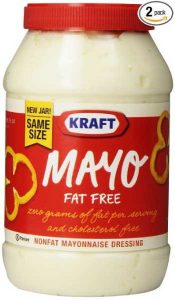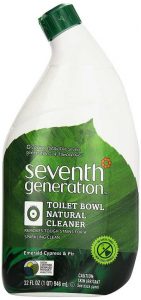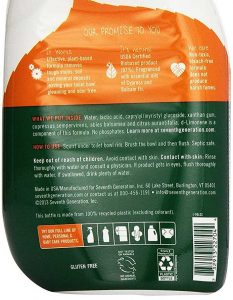Fat-Free is out. Gluten-Free is in. It seems that about once every 10 years, people decide that some common food is evil, a single specific food that makes us sick and fat. 10 years ago, the evil food was fat. Do you remember when fat-free products filled supermarket shelves? Some of these products were a mystery to me, like fat-free mayonnaise. I have no idea what fat-free mayonnaise is made out of, and I don’t care because I will never buy it. Kraft still makes this suspicious product.  I also still see fat-free half and half, fat-free sour cream, and fat-free cream cheese in supermarket dairy cases. These are also products that baffle me. I was just at Berkeley Bowl, where I saw ‘Pam Olive Oil.’ The label says that this product is fat-free and has zero calories per serving. Fat-free, no-calorie olive oil?? What do suppose that is? It sounds bizarre. Fat-free olive oil? Really?
I also still see fat-free half and half, fat-free sour cream, and fat-free cream cheese in supermarket dairy cases. These are also products that baffle me. I was just at Berkeley Bowl, where I saw ‘Pam Olive Oil.’ The label says that this product is fat-free and has zero calories per serving. Fat-free, no-calorie olive oil?? What do suppose that is? It sounds bizarre. Fat-free olive oil? Really?
Today’s evil food is gluten. It seems like nearly everyone these days is gluten intolerant, gluten sensitive, gluten allergic, or has celiac disease. About 1/4 of the people who come to my chocolate room tell me that they can’t eat my chocolate dipped shortbread or molasses cookies because they contain wheat flour. That’s OK with me. It saves me money since I give all my cookies away for free.
40% of Americans believe that they are gluten intolerant or avoid eating foods with gluten in them because they believe that eating gluten is bad for their health. However, if you think about it, gluten intolerance couldn’t really be that common. Western civilization could never have developed if such a large portion of the population couldn’t digest wheat normally. Wheat is the basis of all Western civilization, from ancient Egypt, Greece, and Rome to Europe and America today. The people who built the pyramids of Egypt had a diet based on wheat bread. So did the people who built the Parthenon in Athens, the aqueducts of Rome, the medieval cathedrals of France and Germany, the Panama Canal, and the Googleplex.
Over 90% of people who believe that they are gluten sensitive can actually digest gluten normally. That was the conclusion of a lengthy study conduced at the University L’Aquila in Italy and published in Digestion magazine. Many other universities have conducted similar studies and come to similar conclusions.
So – how come so many people falsely believe that they are gluten intolerant? It is very simple. We are bombarded every day with anti-gluten TV commercials and supermarket displays. Manufacturers of gluten-free foods tell us over and over that gluten is bad for us and that we can improve our health and lose weight effortlessly by buying and eating their products. However, gluten-free doesn’t mean ‘healthy’ or ‘low calorie.’ Many gluten-free products are loaded with sugar, chemicals, and fat. Coca Cola, fried pork rinds, Hershey bars, and Big Dipper huckleberry ice cream are all gluten-free, but you aren’t going to improve your health or lose weight by eating them. We are also bombarded with TV infomercials in which celebrities tell us how they lost 50 or 100 pounds simply by cutting gluten out of their diet and eating rice or corn instead of wheat.
Yes, some people really are gluten intolerant, and celiac disease is a real disease, but how common is it? Celiac disease is a hereditary disease that affects about 3 million Americans, or roughly 1% of the population. People with celiac disease should never eat gluten. There is a lot of debate in the scientific community as how many people are truly gluten sensitive, but the actual number is a small fraction of what most people think. If you think you have celiac disease or are gluten sensitive, tell your doctor and get tested for it. Most people who believe they are gluten sensitive actually aren’t.



